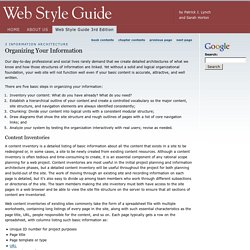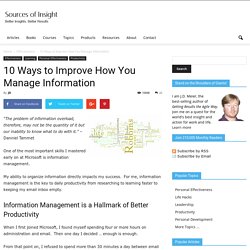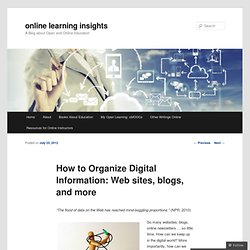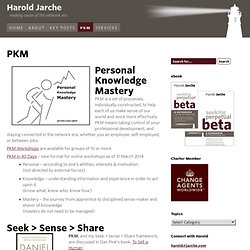

Organizing Your Information. Our day-to-day professional and social lives rarely demand that we create detailed architectures of what we know and how those structures of information are linked.

Yet without a solid and logical organizational foundation, your web site will not function well even if your basic content is accurate, attractive, and well written. There are five basic steps in organizing your information: Inventory your content: What do you have already? What do you need? Establish a hierarchical outline of your content and create a controlled vocabulary so the major content, site structure, and navigation elements are always identified consistently;Chunking: Divide your content into logical units with a consistent modular structure;Draw diagrams that show the site structure and rough outlines of pages with a list of core navigation links; andAnalyze your system by testing the organization interactively with real users; revise as needed.
Content Inventories Hierarchies and taxonomies Brainstorming. 10 Ways to Improve How You Manage Information. “The problem of information overload, therefore, may not be the quantity of it but our inability to know what to do with it.” – Danniel Tammet One of the most important skills I mastered early on at Microsoft is information management.

My ability to organize information directly impacts my success. For me, information management is the key to daily productivity from researching to learning faster to keeping my email inbox empty. Information Management is a Hallmark of Better Productivity When I first joined Microsoft, I found myself spending four or more hours on administration and email. From that point on, I refused to spend more than 30 minutes a day between email and administration overhead. 10 Ways to Master Information Management Here are ten of my favorite ways to manage information: 1. Carve out action items, To Dos, and tasks from your incoming streams of information. if it’s not an action, it’s reference. 2. 3. Put things into collections or think in terms of collections. 4. 5. 6.
How to Organize Digital Information: Web sites, blogs, and more. “The flood of data on the Web has reached mind-boggling proportions.”

(NPR, 2010) So many websites, blogs, online newsletters … so little time. How can we keep up in the digital world? More importantly, how can we transform information into knowledge? Before information becomes knowledge it’s data, yet another challenge is finding good data when it’s needed. What is Personal Knowledge Management (PKM)? The System to PKM The first and essential component to effective management of digital information is the system itself. Find the right tool or application to manage your digital content. 1) The Tool There are many tools to choose from for managing and sharing digital information, yet the selection of the tool is critical, it can make or break your system.
Pealtrees: I discovered Pearltrees, which is a fluid and intuitive tool that allows me to manage digital information easily. To expand a ‘tree’ I simply click on the circle associated with the category. 3) The method Like this: PKM. PKM is a set of processes, individually constructed, to help each of us make sense of our world and work more effectively.

PKM means taking control of your professional development, and staying connected in the network era, whether you an employee, self-employed, or between jobs. PKM Workshops are available for groups of 10 or more. PKM in 40 Days – new format for online workshops as of 31 March 2014 Personal – according to one’s abilities, interests & motivation. (not directed by external forces)Knowledge – understanding information and experience in order to act upon it. PKM, and my Seek > Sense > Share framework, are discussed in Dan Pink’s book, To Sell is Human: To make sense of the world, for ourselves and those we hope to move, we must wade through a mass of material flowing at us every day – selecting what’s relevant and discarding what’s not. PKM gives you a framework to develop a network of people and sources of information that you can draw from on a daily basis.